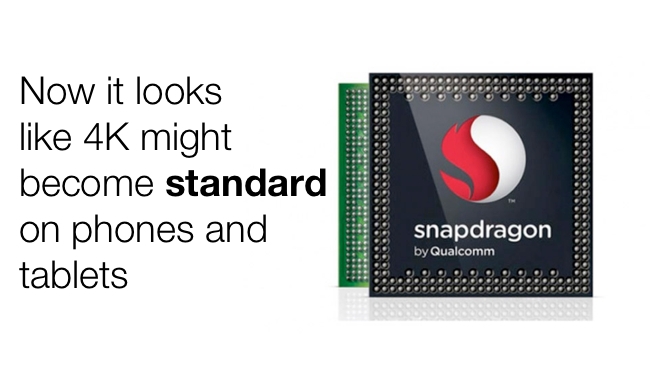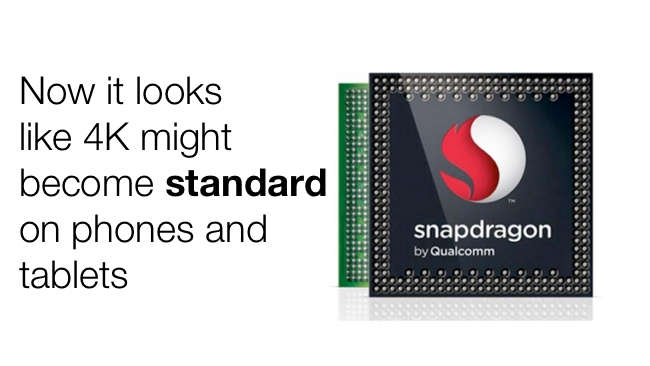
 Qualcomm 4K on a Smartphone
Qualcomm 4K on a Smartphone
We thought it was pretty remarkable when Nvidia announced their new Tegra 4 chipset that will bring 4K capabilities to tablets and phones. And it is. But it's no longer unique. To pretty much everyone's surprise, Qualcomm said yesterday that they too were going to release a 4K video-capable chipset too
The Qualcomm Snapdragon 800 is able to not only play back 4K material, but encode it as well, which strongly suggests that it will be used in smartphones with 8 megapixel smartphone cameras to record extremely high quality video. The device will not support 4K displays though, only 4K playback (scaled, presumably, to lower resolutions).
Excerpt from Qualcomm's press release
Breakthrough multimedia experiences: The Qualcomm Snapdragon 800 processors also introduce the very latest mobile experiences.
• Capture, playback and display in UltraHD video (with four times 1080p pixel density)
• Dual Image Signal Processors (ISP) for Qualcomm Snapdragon Camera with support for computational camera
• HD multichannel audio with DTS-HD and Dolby Digital Plus for enhanced audio
• Higher display resolutions (up to 2560x2048) and Miracast 1080p HD support
•
The Qualcomm Snapdragon 800 processors are currently sampling and expected to be available in commercial devices by mid-year 2013.
All of this fans the 4K debate into a firestorm, and one that is not necessarily going to bring any clarity to the arguments.
With cameras - especially professional ones - it is easy enough to make a case for at least acquiring content in 4K resolution. And it's actually not that difficult, apart from the huge data rates involved. After all, 4K is "only" equivalent to 8 megapixels, and most still cameras passed that milestone some time ago.
Questions
But there is a huge question over whether smartphones can ever have sufficiently good optics, and big enough sensors to really give a good image at higher-than-HD levels of resolution. For now, the answer is almost definitely no.
But that's not to say that 4K processing would be without any use at all. Remember the Nokia phone with 41 megapixels? It doesn't output 41 megapixel stills or video, but interpolates massively from the larger number of pixels to create lower resolution video with low noise and impressive sharpness. Perhaps the new Qualcomm chipset could be used to downsample video to a less impressive, but better looking, lower resolution, and also allow for some degree of loss-free digital zooming?
Finally, it is surely very significant that two of the major players in the mobile arena have announced within days that they're supporting 4K video. Just a year ago, any suggestion that this might happen within 12 months would have been greeted with utter disbelief!
What do you think? Is this an important development or is 4K on smartphones complete and utter nonsense?
Tags: Technology


Comments